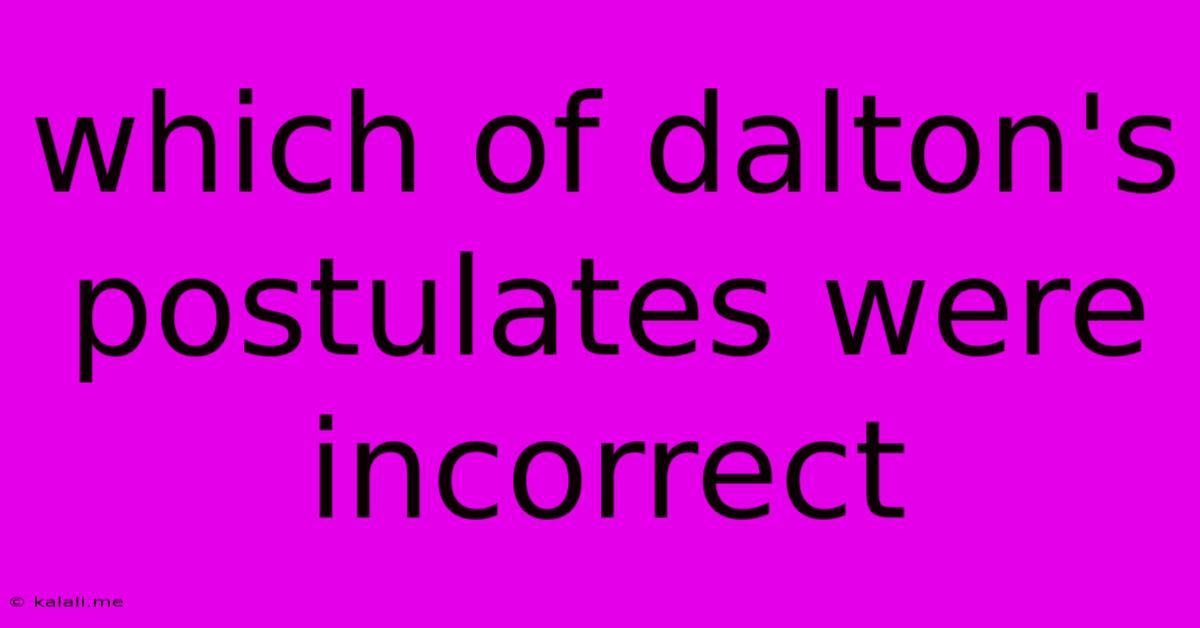Which Of Dalton's Postulates Were Incorrect
Kalali
Jun 15, 2025 · 3 min read

Table of Contents
Which of Dalton's Postulates Were Incorrect? A Look at the Evolution of Atomic Theory
John Dalton's atomic theory, proposed in the early 1800s, revolutionized our understanding of matter. While groundbreaking for its time, some of his postulates have since been proven incorrect or incomplete due to later scientific discoveries. This article will delve into Dalton's postulates and explore which ones have been superseded by modern atomic theory. Understanding these inaccuracies provides valuable insight into the iterative nature of scientific progress.
Dalton's Postulates: A Recap
Before analyzing the inaccuracies, let's briefly review Dalton's five main postulates:
- All matter is made of atoms: Atoms are indivisible and indestructible particles.
- All atoms of a given element are identical: They have the same size, mass, and chemical properties.
- Atoms of different elements have different properties: This includes differing masses and chemical behaviors.
- Atoms combine in simple, whole-number ratios to form chemical compounds: This explains the law of definite proportions.
- Atoms can be rearranged, combined, or separated in chemical reactions: However, atoms themselves are neither created nor destroyed.
Postulates Proven Incorrect or Incomplete:
Of these postulates, several have been modified or outright refuted by subsequent scientific advancements:
1. Atoms are indivisible and indestructible: This postulate is demonstrably false. The discovery of subatomic particles – electrons, protons, and neutrons – in the late 19th and early 20th centuries proved that atoms are indeed divisible. Nuclear reactions further demonstrate the capacity for atoms to be transformed into other elements. The concept of nuclear fission and fusion directly contradicts this postulate.
2. All atoms of a given element are identical: This is also incorrect. While all atoms of a given element share the same number of protons (defining their atomic number), they can have differing numbers of neutrons. These variations are known as isotopes, possessing the same chemical properties but different masses. The discovery of isotopes significantly refined our understanding of elemental composition.
3. The limitations of simplicity in chemical compounds: Although Dalton correctly observed that atoms combine in simple whole-number ratios, this is not universally true for all compounds. Many complex molecules exhibit more intricate bonding arrangements, not strictly adhering to simple ratios. This limitation reveals the nuanced complexity of molecular structures beyond Dalton’s initial framework.
Postulates that Remain Largely Valid:
Despite these inaccuracies, two of Dalton's postulates remain foundational to modern atomic theory:
- All matter is made of atoms: This remains a cornerstone of our understanding of matter. While we now know atoms are complex structures containing subatomic particles, the fundamental concept of matter being composed of atoms persists.
- Atoms combine in simple, whole-number ratios to form chemical compounds: While not universally applicable to all compounds, this principle remains crucial in understanding basic chemical stoichiometry and the formation of many compounds.
Conclusion:
While not entirely accurate, Dalton's atomic theory laid the crucial groundwork for future discoveries. Recognizing the limitations of his postulates highlights the iterative and self-correcting nature of scientific investigation. Modern atomic theory builds upon Dalton's insights, integrating subsequent discoveries to provide a more comprehensive and accurate model of the atom and its behavior. The imperfections in Dalton's work serve as a testament to the continuous evolution of scientific understanding.
Latest Posts
Latest Posts
-
The Shoulder Joint Is An Example Of A
Jun 15, 2025
-
How To Print Sat Admission Ticket
Jun 15, 2025
-
Shortcut Key For Increasing Font Size
Jun 15, 2025
-
What Is The Square Root Of 208
Jun 15, 2025
-
Atomic Mass Is Equal To The Number Of
Jun 15, 2025
Related Post
Thank you for visiting our website which covers about Which Of Dalton's Postulates Were Incorrect . We hope the information provided has been useful to you. Feel free to contact us if you have any questions or need further assistance. See you next time and don't miss to bookmark.